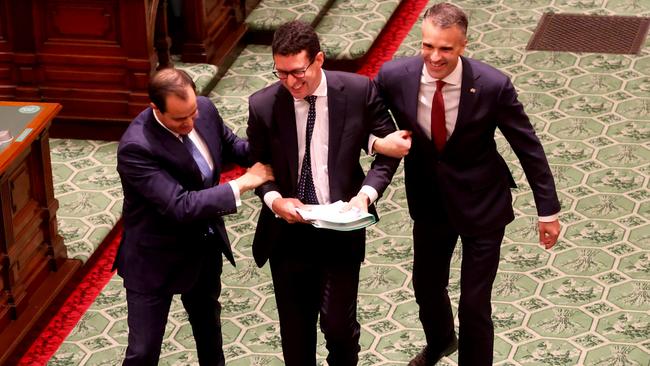‘Double standard’ over SA politician, student mask rules, expert says
Politicians don’t have to wear masks in parliament – but students and teachers have to in schools. That’s a double standard, one expert says.
SA News
Don't miss out on the headlines from SA News. Followed categories will be added to My News.
Politicians are holding schoolchildren to higher standards than themselves after parliament returned with no mask mandate this week.
Students in years 7 to 12 and teachers will be required to wear face masks in the classroom for at least the next four weeks following the start of term 2 on Monday, while masks are still “strongly encouraged” for students in years 3 to 6.
Despite several MPs being sidelined with Covid, politicians were not beholden to mask rules during the first sittings of the new parliament – though a small number opted to wear them in the chamber.
Professor Adrian Esterman, an epidemiologist at the University of South Australia, said the conflicting rules were an example of “all sorts of double-standards floating around” in relation to mask mandates.
He said mandates that related to certain school year levels were “arbitrary”, and advocated a uniform approach within the community.
“I think everybody should be wearing masks, whether or not they’re parliamentarians,” he said.

“If (politicians) don’t wear face masks when they’re sitting, then they’re totally exposed to picking up an infection.”
However, he said there was debate around the effectiveness of masks in schools.
“Wearing masks for schoolchildren might not actually do much because virtually everyone has been infected,” he said.
A recent survey from the US, which Prof Esterman said “is not going to be that different here”, found three-quarters of all schoolchildren have been infected – a greater percentage than among the general population.
Lea McBride, of Grange, whose son Mackenzie and niece Jorja must adhere to the mandate, said masks had an impact on students‘ learning.
“It’s harder to communicate, harder to focus on what is happening and harder to hear what the teacher is saying,” she said.
“It’s frustrating to see that the politicians who are making these mandates are not even doing it themselves.”
Ms McBride said mask mandates should be reintroduced or completely scrapped, but school students should not be subject to a different set of rules.
Australia’s former deputy chief medical officer, Dr Nick Coatsworth, has previously warned mask mandates were detrimental to learning.
“You’re not actually protecting the kids themselves because it’s a very, very mild disease in children, with or without the vaccine,” he said.


Australian Education Union SA president Andrew Gohl said classrooms were “unique environments” that involve a large number of people gathering in a confined space for extended periods of time.
He said the rules that allow close contacts to continue attending school increase the chances of Covid entering classrooms.
“All those factors mean that it’s appropriate, in terms of ensuring a safe learning and working environment as far as possible, that masks continue to be in place,” he said.
Mr Gohl said school classrooms and state parliament were “very different environments”.
“Parliamentarians have the capacity to organise their seating … but that’s not possible in the classroom,” he said.
In a statement to parliament this week, Education Minister Blair Boyer said mask rules would be reviewed at the four-week mark.
He said the rules aimed to minimise the disruption that schools experienced in term 1.
“We’ve prepared for term 2 and we are doing everything we can to minimise the disruption to our staff, students and their families,” he said.
“Our focus is keeping kids learning at school and preschool.”





